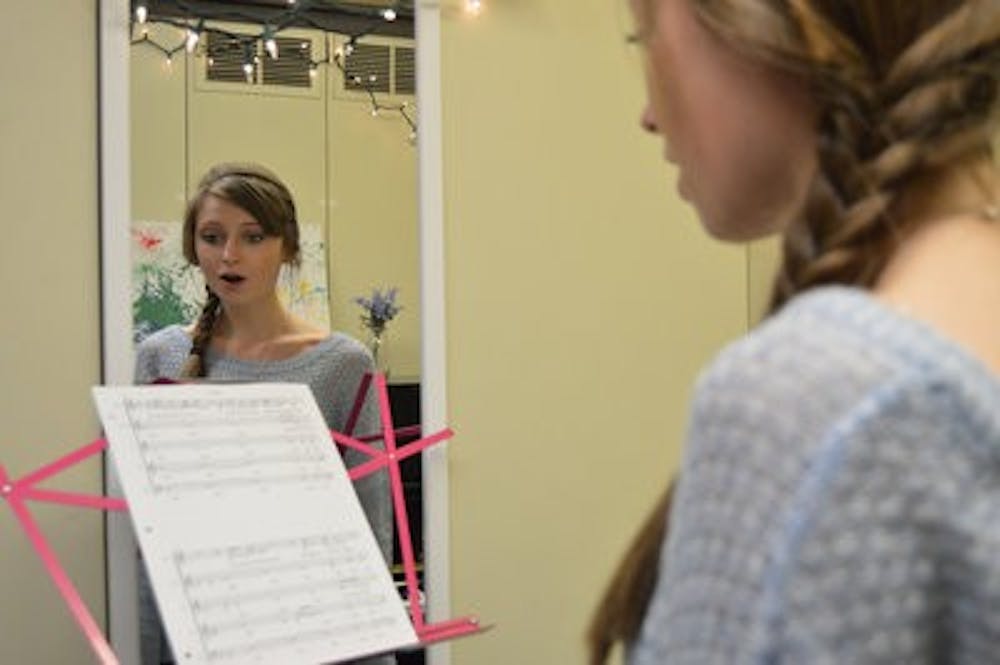In a dark room in Goodwin Hall at 2 p.m. on a Wednesday, people may hear a student belting out opera or the sounds of a trumpet sonata.
Nearly every Wednesday, approximately five music students perform a piece for peers and teachers. This is just one of the zero credit-hour activities required for all music students according to Sarah Shearer, senior in vocal performance.
It's known as Convocation, and other than the second Wednesday of each month, it happens weekly. Music students are required to attend all except two, and they must perform in it once per semester. Anyone is welcome to attend Convocation, but it is usually just students and faculty from the music department according to Christopher Schiller, junior in vocal performance.
Convocation is one of the many requirements of the music program many other students are not aware of. Schiller said most music majors take more than 18 hours per semester.
"A lot of times, for music classes, you go for four hours a week, but you only get one hour of credit," Shearer said.
Tyler Pilz, junior in music liberal arts, said he spends more than 26 hours per week working for class from rehearsals to Convocation to actual class time, even though he officially receives credit for 18 hours.
Singers can only practice for approximately one hour at a time, according Schiller.
"Our voice gets tired, so it's hard to budget practicing outside of rehearsal," Schiller said. "Piano majors practice a lot longer than anybody else. On average, they probably practice 3-4 hours a day in addition [to time in class]."
Students focusing on vocal performance or another instrument said piano majors practice a great deal.
"They have to learn their music and then everyone else's music as well because they accompany [other performers]," said Jonathan Wilson, senior in music education.
Piano students practice approximately six hours per day in total, according to Yae Chong, junior in music liberal arts.
"After classes, you do extra," Chong said. "Between classes you might want to get a little practice in, like 15 or 20 minutes."
Other reasons piano students receive so much praise from fellow classmates is because they memorize their pieces along with those of the other students they accompany.
"We pay them $40 a month to learn all of our pieces and go with us to performance and studio while they go to all of their performances," Schiller said. "My accompanist has a boy repertoire, a girl repertoire, a bassoon player and she is learning her own stuff."
As much credit as the piano students receive from classmates, singers and other instrumentalists put in long hours for rehearsal as well.
Shearer said she is taking 21 hours and an overloaded schedule every semester.
"Because I'm a dual degree, I have to have 52 extra hours in addition to a normal major," Shearer said. "It's doable. It's just a lot of work."
According to Shearer, Auburn does not have a performing arts center, a big deterrent for prospective music students
Choirs have to rent out the theater from the theater department or use Auburn High School's performing arts center for concerts.
Despite the lack of resources in some areas, students are optimistic about the future of music at Auburn.
"Auburn music is on the rise," Schiller said. "(One) of the biggest pluses is we're getting one-on-one instruction."
At another school, many music students would likely be taking lessons from a doctoral student, but the Schiller said music students at Auburn have the opportunity to learn directly from professors.
"This is a more well-rounded experience," Schiller said. "We get to major in music at a state school that's big and does football and has tons of things going on. At a music school, I wouldn't be able to get that same experience."
Students are able to show off some of their hard work through shows throughout the semester. In November and December, there are 16 concerts put on by AU Singers, faculty, Tiger Strings and Jazz Band.
Auburn.edu/music has the complete list of concert dates and locations.
Do you like this story? The Plainsman doesn't accept money from tuition or student fees, and we don't charge a subscription fee. But you can donate to support The Plainsman.




